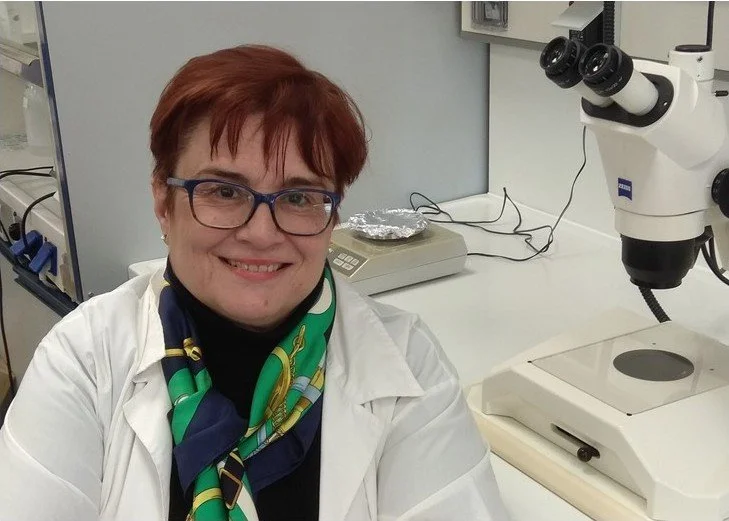From protein folding and assembly to biomaterials!
Welcome to a webinar with Anna Mitraki, University of Crete, Greece.
Please note that this is a webinar (only digital).
When: Tuesday 30 January, 2024, 15:00–16:00 CET
Where: Online-only via Zoom. Registered participants will receive a Zoom-link the same day as the event, as well as with the registration confirmation.
Title: Protein and peptide self-assembling biomaterials: from structural biology to biomaterials design
Speaker: Anna Mitraki, Professor at the Department of Materials Science and Technology, University of Crete, Greece.
Abstract
Natural fibrous folds are a rich source of basic structural and folding knowledge and can serve as inspiration basis for the rational design of scaffolds targeted for biomaterials applications. Our research focuses on adenovirus fibers that consist of an ultra-stable, intertwined fold consisting of beta-strands, loops and turns, named the “triple-beta-spiral”. This fold can be used as a designable structural framework for engineering additional functionalities in order to serve as delivery vehicle. We have recently demonstrated that in vivo biotinylated adenovirus fiber-fibritin foldon hybrids can deliver nanoparticles and active enzymes into model cell lines: (Kokotidou et al., Biomolecules 12 :308 (2022) https://doi.org/10.3390/biom12020308). These constructs could constitute a stepping stone for the development of multifunctional and modular protein platforms that can be tailored to applications at the sequence level.
Moreover, we pioneered the use of short peptides corresponding to the basic repeating sequences of the adenovirus fiber shaft as self-assembling, amyloid-like fibril scaffolds for the templating of inorganic nanoparticles and cell-targeting motifs. We developed a design strategy for engineering various functionalities at the sequence level by keeping a constant central self-assembling beta-strand core and rationally changing amino acids at exposed loop positions. In collaboration with Prof. Phanourios Tamamis at Texas A&M University we have combined computational and experimental approaches towards rational peptide designs of increasing complexity. For example, the basic peptide scaffolds were further designed to contain positively charged and aromatic residues at key exposed positions in order to additionally promote DNA condensation and cell internalization. This enabled the designer peptide fibrils to act as CPP (Cell-Penetrating Peptides), to efficiently enter mammalian cells while carrying packaged plasmid DNA and act as gene transfer vehicles: (Kokotidou, et al., Biomolecules 10, 7 (2020), https://doi.org/10.3390/biom10010007 ).
I will discuss the wider/general applicability of fibrous folds and self-assembling peptides through merging insights ranging from theoretical and structural knowledge to bioengineering principles towards applications.
Bio
A chemist and biochemist by training, Prof Anna Mitraki has been working for more than 30 years on the folding, assembly and structure of natural fibrous proteins, such as phage P22 tailspikes and adenovirus fibers. She subsequently got interested in using them as models for the design of novel fibrous materials. She is also particularly interested in translating fundamental structural knowledge from natural fibrous proteins into concrete integration strategies and applications in the area of fibrous bio-nano-materials. She especially focuses on the study and use of amyloid-like, self-assembling peptide materials as technological objects and their integration in innovative applications. These efforts rely not only on biochemical and structural methodologies, but also on the fostering of interdisciplinary collaborations with colleagues from other disciplines (eg laser science) that develop techniques to manipulate, assemble and position these materials in a controlled manner. She is also continuing to work on adenoviral proteins and their self-assembly with particular focus on their use as transfer vehicles for small molecules, nucleic acids and enzymatic moieties targeted for delivery applications.
Prof Mitraki holds a BS in Chemistry, from University of Thessaloniki, Greece, 1981 and a PhD in Biochemistry, from Universite de Paris-Sud, Orsay, France, 1986 (work on enzyme folding, assembly and aggregation with Professor Jeannine Yon-Kahn). She was a Post-doctoral associate (1987-1991) and then Research Scientist (1991-1994) at the Massachusetts Institute of Technology, Cambridge, MA, U.S.A. (work on folding and assembly of fibrous phage proteins with Professor Jonathan King) and a Research scientist at the Institut de Biologie Structurale in Grenoble, France (French National Research Center) from 1995 to 2004. Habilitation, Universite Joseph Fourier, Grenoble, France, in 2003, for work on structure, folding and assembly of beta-structured fibrous proteins and their self-assembling peptides. She was appointed Associate Professor, Department of Materials Science and Technology, University of Crete, Greece in September 2004, and Affiliated Research Scientist with the Institute for Electronic Structure and Laser, FORTH. Academic Editor, PLoS ONE (2009-2014, www.plosone.org). Editorial Board of the Journal "Biomolecules" (2019-).
Since September 2014, she is a Professor at the Department of Materials Science and Technology, University of Crete, Greece.
Web page: https://www.materials.uoc.gr/faculty/anna-mitraki/
Contact: Please contact josefin.martell@linxs.lu.se for any practical questions.
During our events we sometimes take photographs and short film clips to profile our activities. Please let us know if you don’t want to be in any photos/films before we start the event. Some webinars are recorded to be used for educational purposes in the LINXS website.
By registering to our events you give your permission to LINXS, according to the General Data Protection Regulation (GDPR), to register your name and e-mail address to be used for the sole purpose of distributing newsletters and communications on LINXS activities.

